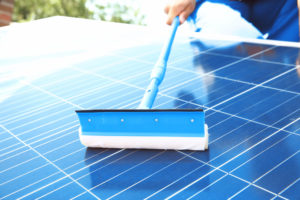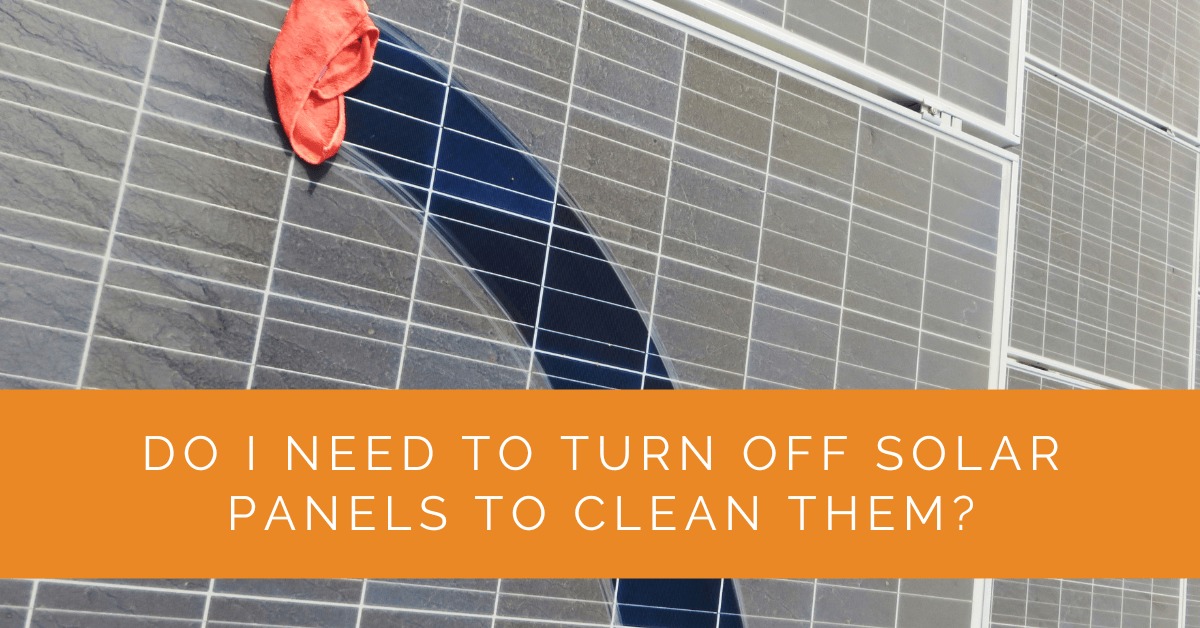Solar panels are essential to a renewable energy system, converting sunlight into electricity. Solar panels require regular maintenance, including cleaning, like any other equipment, to ensure optimal performance. However, one common question is whether turning off solar panels before cleaning them is necessary. This article will explore the safety considerations and perspectives surrounding this topic to help you make an informed decision.
Contents
Key Takeaways
- Professionals recommend turning off solar panels before cleaning to minimize the risk of electrical accidents and damage.
- Safety precautions, such as wearing personal protective equipment and using non-conductive cleaning tools, can mitigate risks when cleaning energized solar panels.
- Consulting professionals and following manufacturer guidelines are essential to make an informed decision based on system size, location, and cleaning methods.
Understanding Solar Panel Safety
Before delving into the main question, it’s crucial to understand the safety aspects associated with working on solar panels. Solar panels generate electricity when exposed to sunlight, and this electricity poses potential hazards if proper precautions are not taken. Understanding these risks is paramount to ensure the safety of both yourself and the equipment.
Electrical Hazards
Solar panels generate Direct Current (DC) electricity, which can deliver a powerful shock if mishandled. Treating solar panels with the same caution as any electrical system and taking appropriate safety measures is essential.
Risks of Cleaning Energized Panels
Cleaning solar panels while still producing electricity can increase the risk of electrical accidents. Water or cleaning solutions coming into contact with electrical connections or live circuitry may lead to electrical shock or damage to the panels.
Electrical Shutdown: Yes or No?
When it comes to turning off solar panels before cleaning, the industry has differing perspectives. Let’s explore both sides of the argument to gain a comprehensive understanding.
The Case for Turning Off Solar Panels
Many professionals recommend turning off solar panels before cleaning them due to the associated safety risks. By shutting down the system, you eliminate the flow of electricity, minimizing the chances of accidents or damage. This approach is especially important when cleaning rooftop solar panels or large-scale systems.
Consider the following factors supporting the case for turning off solar panels:
- Safety Precautions: Turning off the solar panels ensures a safer working environment by reducing the risk of electrical shock. It provides peace of mind while cleaning and minimizes the potential for accidents.
- Electrical Hazards: Solar panels may continue generating electricity even in low light conditions, such as during cloudy days, early mornings, or evenings. Turning off the system eliminates any unexpected electrical output and mitigates potential risks.
- Manufacturer Guidelines: Many solar panel manufacturers recommend shutting down the system before cleaning. Following the manufacturer’s guidelines helps maintain warranties and ensures adherence to best practices.

The Case Against Turning Off Solar Panels
While the argument for turning off solar panels is valid, some argue it may not be necessary. This perspective considers safety measures and alternative cleaning methods that can be employed while energizing the system.
Consider the following factors supporting the case against turning off solar panels:
- Safety Measures: Implementing appropriate safety measures can significantly reduce the risks of cleaning energized solar panels. For instance, wearing personal protective equipment (PPE), such as insulated gloves and safety glasses, can enhance safety while working on live systems.
- Non-Conductive Tools and Methods: Using non-conductive cleaning tools, such as soft-bristle brushes or squeegees, along with water or non-abrasive cleaning solutions, can minimize the chance of electrical accidents. These methods focus on keeping water away from electrical connections and live circuitry.
- Small-Scale Systems: For small-scale solar systems, such as residential rooftop installations, the electrical risks may be relatively lower due to lower voltages and safety features in modern inverters. However, it is still essential to exercise caution and consult with professionals.
Case Study: Safe Cleaning Practices for Solar Panels
Background
At Solar Panels Network USA, we prioritize safety and efficiency in all our projects. A recent client, a residential homeowner with a rooftop solar installation, sought our advice on the best practices for cleaning their solar panels. They were particularly concerned about the safety implications of cleaning energized panels.
Project Overview
The client’s rooftop solar system comprised 20 panels, and their primary concern was maintaining optimal performance while ensuring safety during the cleaning process. We aimed to provide a comprehensive solution that addressed their concerns and upheld best practices in solar panel maintenance.
Planning and Preparation
Assessing the System and Risks
We began by evaluating the client’s solar system, noting the panel arrangement, roof access points, and potential hazards such as electrical connections and shading patterns. Understanding the risks associated with cleaning energized panels was crucial.
Gathering Tools and Equipment
To ensure a thorough and safe cleaning process, we gathered the following tools and equipment:
- Personal Protective Equipment (PPE) including insulated gloves and safety glasses
- Non-conductive cleaning tools such as soft-bristle brushes and squeegees
- A mild detergent and water solution for cleaning
- Safety harnesses and ladders for secure roof access
Implementation
Turning Off the Solar Panels
Given the potential electrical hazards, we advised the client to turn off the solar panels before cleaning. This step ensured that there was no electrical current flowing through the panels, eliminating the risk of shock. We demonstrated the proper shutdown procedure, adhering to the manufacturer’s guidelines.
Cleaning the Panels
Once the panels were de-energized, we proceeded with the cleaning process:
- Inspection: Before cleaning, we inspected the panels for any visible damage or loose connections.
- Cleaning Method: Using a mild detergent and water solution, we gently cleaned the panel surfaces with non-conductive brushes, ensuring no water entered the electrical components.
- Rinsing and Drying: We rinsed the panels with clean water and allowed them to air dry, ensuring no streaks or water spots were left behind.
Safety Measures
Throughout the process, we emphasized safety:
- We used safety harnesses and secured ladders to ensure safe roof access.
- All team members wore PPE to protect against potential hazards.
- We avoided cleaning during peak sunlight hours to minimize the risk of heat-related injuries.
Results
The cleaning process was completed successfully, with the solar panels restored to optimal efficiency. The client was pleased with the thoroughness of our approach and the emphasis on safety.
- Improved Performance: Post-cleaning, the client observed a noticeable improvement in their solar panel output, translating to better energy production.
- Enhanced Safety: By turning off the panels and using non-conductive tools, we ensured a safe cleaning process without compromising the system’s integrity.
Summary
Cleaning solar panels is essential for maintaining their efficiency and longevity. This case study highlights the importance of turning off solar panels before cleaning to ensure safety. Proper planning, using the right tools, and adhering to safety protocols can mitigate risks and enhance the performance of solar installations. At Solar Panels Network USA, we are committed to providing safe and effective solutions for all our clients’ solar needs, ensuring they can enjoy the benefits of clean energy without compromising safety.
Expert Insights From Our Solar Panel Installers About Cleaning Solar Panels
Turning off solar panels before cleaning them is crucial for safety. Even a small amount of residual current can pose a risk of shock, especially when water is involved.
Senior Solar Installer
Using non-conductive tools and proper PPE can mitigate risks, but turning off the system eliminates any chance of electrical mishaps. It’s always better to be safe than sorry.
Solar Installation Specialist
Always follow the manufacturer’s guidelines. They know their products best, and adhering to their recommendations can also help maintain your warranty.
Lead Solar Technician
Experience Solar Excellence with Us!
Trust in Solar Panels Network USA, where our seasoned experts deliver top-quality solar solutions for homes and businesses nationwide. With a legacy of countless successful installations and a commitment to sustainable energy, we’re your reliable partner in the solar journey. Ready for a brighter, eco-friendly future? Call us now at (855) 427-0058 and harness the power of the sun!
Conclusion
Whether to turn off solar panels before cleaning them encompasses important safety considerations. While the case for turning off solar panels highlights the need for increased safety and adherence to manufacturer guidelines, the case against turning off solar panels emphasizes the potential for safe cleaning practices while keeping the system energized. Ultimately, the decision to turn off or keep solar panels on during cleaning should be based on a thorough understanding of the associated risks, system size, and adherence to safety measures.
To ensure the safety of yourself and the equipment, it is always advisable to consult with professionals or solar panel experts. They can provide guidance based on your specific circumstances, including the size of your system, the location of the panels, and the cleaning methods employed.
Remember, the primary goal is to maintain the optimal performance of your solar panels. Regular cleaning is crucial to remove dirt, debris, or other substances hindering their efficiency. Whether you turn off your solar panels or clean them while energized, always prioritize safety, follow manufacturer guidelines, and use appropriate cleaning methods and tools.
By taking these precautions, you can maintain the efficiency and longevity of your solar panel system, allowing you to continue enjoying the benefits of clean and renewable energy for years to come.
About the Author
Solar Panels Network USA stands at the forefront of solar energy solutions, driven by a team of seasoned solar engineers and energy consultants. With over decades of experience in delivering high-quality solar installations and maintenance, we are committed to promoting sustainable energy through customer-centric, tailored solutions. Our articles reflect this commitment, crafted collaboratively by experts to provide accurate, up-to-date insights into solar technology, ensuring our readers are well-informed and empowered in their solar energy decisions.

